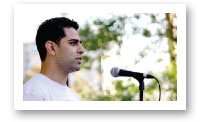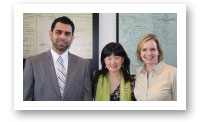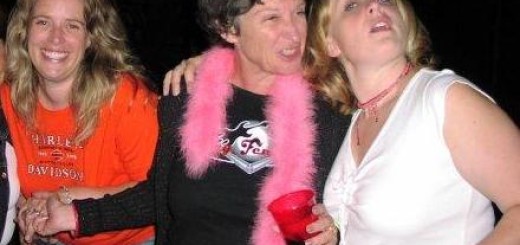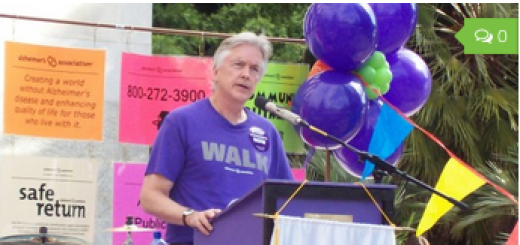On a Personal Note
 “When I was approximately 17 years old, my family and I noticed my father’s behavior begin to change. He misplaced items around the house and wandered without direction. We didn’t know what to think. It was not until the winter of 1996 that my family and I realized our lives were going to change forever.
“When I was approximately 17 years old, my family and I noticed my father’s behavior begin to change. He misplaced items around the house and wandered without direction. We didn’t know what to think. It was not until the winter of 1996 that my family and I realized our lives were going to change forever.
I vividly remember that night. My father left the house at 5 p.m. to purchase a gallon of milk at the local grocery store. It was already dark and it had been raining for a week straight. An hour passed and my dad had not returned. At 7 p.m. we drove to the store to see if he was involved in a vehicle collision, but we were unable to locate him.
Five hours passed and we did not have any news. My mother, brother and I were huddled in our living room waiting for the telephone to ring. At approximately 10:30 p.m. we heard a knock at the door. It was a man in his early twenties. He asked if my dad lived here and told me my dad was in his vehicle.
He had found my dad at a gas station, approximately a mile in the opposite direction of the grocery store. My dad was soaking wet from being in the rain and was asking people for directions to get home. In broken English, my father approached this young man and asked him for assistance. My father was disoriented and unable to communicate clearly and the young man did not speak Spanish. Somehow, he was able to obtain my father’s driver’s license, locate our address on a map and take him home.
1996 to 1998 were years of uncertainty. We didn’t know what to make of my father’s behavior. While we were confident his behavior would improve, it only continued to deteriorate. Unfortunately, we just didn’t know enough about Alzheimer’s. My father was eventually diagnosed with Alzheimer’s on October 20, 1998.
In retrospect, all my father’s early behaviors were clear signs he was suffering from dementia. We even had a history of Alzheimer’s in our family. My paternal uncle told me that my great grandfather was “crazy.” He described “crazy,” as being disoriented, forgetful and unable to perform basic tasks. In an attempt to keep him near his house, they would tie him to a tree so he would not wander off in the hills and get lost. He was not “crazy.” He was suffering from Alzheimer’s.
My family and I did not know what the future held for us, but our lives slowly began to change. My mother’s role as a wife began to transform to a full-time caretaker. My brother and I went from viewing my father as an authority figure to caring for him.
These experiences allowed my brother and I to mature at an early age. It also strengthened the bond between my mother, my brother and I. We found ourselves making collective decisions, not only with respect to my father’s care, but our own lives. To this day, there is not an important decision we make without consulting one another.
As our family bond grew stronger, so did the feeling that we could tackle my father’s condition without the assistance of anyone beyond our family, but we were mistaken. Even though we did not reach out to specific organizations for assistance we were lucky many people helped us along the way.
A few months before my father retired, he was unable to perform his daily tasks at work. His employer recognized this and instead of asking my father to stop working, he was given the responsibility of counting boxes. Everyone knew this was done to keep my father working until his retirement.
Also, members of our community were vigilant and there were a number of times they walked my father home when he was found wandering our neighborhood.
 My family and I were in denial about my father’s condition during the early years. We did not seek assistance from community-based organizations. When I reflect on my family’s experience, I realize now how valuable these organizations are for families impacted by Alzheimer’s. In addition to supporting my father’s needs, they could have provided us with the support and respite we needed, in addition to helping us be proactive instead of reactive to the changes we knew, but feared were inevitable.
My family and I were in denial about my father’s condition during the early years. We did not seek assistance from community-based organizations. When I reflect on my family’s experience, I realize now how valuable these organizations are for families impacted by Alzheimer’s. In addition to supporting my father’s needs, they could have provided us with the support and respite we needed, in addition to helping us be proactive instead of reactive to the changes we knew, but feared were inevitable.
As my family continues to care for my father and volunteer to help raise awareness about this disease, I would ask people that they become the kind young man who brings fathers home, the understanding employer who makes accommodations and the vigilant neighbor who keeps a watchful eye.”
“” Jesus Sanchez, family caregiver


















Your story is one I live, I attend support groups but still blind to all that I know must be learned. I don’t have the patience for everything that happens and learn every day it takes time but then about the time i adjust to one thing another change happens. My father passed on from this disease and I think my grandmother also an now my husband is living with it. His mom and granddad had it so its hard to believe that this is not passed on. I have family but they have no real clue as to the daily tasks and chores we take on, they feel for me but they aren’t the ones here 24/7. Any help you can offer to direct me to learning more and what I have to do would be helpful. God bless you, I know its not what god gave us so I don’t blame him.
Thank you for your comments. Attending a support group is a great first step to getting the support and help you need. Please know you can call the Alzheimer’s Association any time, day or night at 800.272.3900 to get advice and find other resources in your community. You can also fill out an online form questions of our care specialists here: http://bit.ly/iactkd
Our message boards are a great resources for caregivers: http://bit.ly/fmOyh0
In addition, we have several classes for caregivers that may be of help to you. A description of the classes and schedules appear here: http://www.alz.org/norcal/in_my_community_education.asp
We’ll have a care specialist follow up with you via email as well.
I feel for everyone that has to or wants to take care of their family with alzheimer’s. I have been taking care of my mother for over 7 years. The first 3 while I was working full time. Then I left work so that I could take care of her full time at her home. I have family (one sister) that lives in town and a brother that lives out of town. I get no help and anything I bring up to them they don’t believe or refuse to believe. My sister tells my mom things that confuse her more and makes my helping her worse. I finally broke down and had to get some outside help. Because I could no longer take care of my mother. I was diagnosed severily depressed and emotionally exhausted. I wish I had gotten help before I broke down. God Bless all caregivers, it is a very hard, emotional job. Many tears, many sleepless nights, and feeling alone.
Jesus: You have touched many lives by sharing your experience. You and your family are a great testament to the power of love and family even in the face of adversity. Those who know you are inspired to be such positive and committed family members as well. Thank you.
Jesus: I learn something about you every day… you are a good son … obviously raised well by a close family. Thank you for sharing this story with us. Take care.